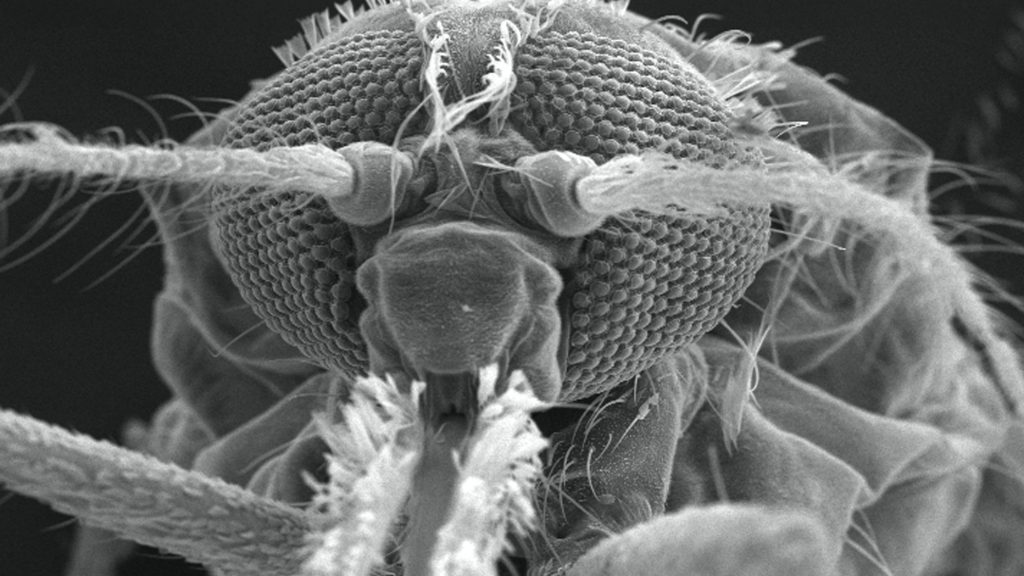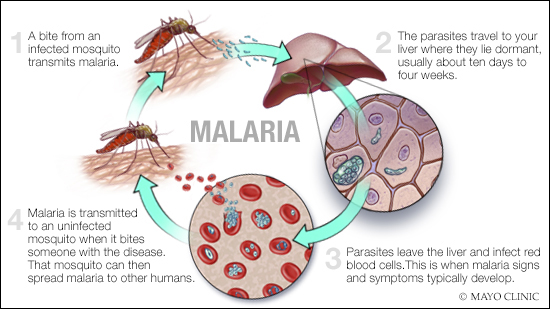-
Featured News
Malaria in the US: A Mayo Clinic expert offers insight, tips on prevention
Malaria, a severe and potentially fatal disease most often caused by the bite of an infected mosquito, has been reported in the U.S. The Centers for Disease Control and Prevention (CDC) released a health advisory because there have been instances of people getting infected with Plasmodium vivax malaria in Florida and Texas, even though they hadn't traveled outside the country. Malaria does not spread from person to person.
"Malaria is caused by parasites in the genus Plasmodium, that are usually injected into people through the bite of a mosquito," says Dr. Bobbi Pritt, director of the Clinical Parasitology Laboratory at Mayo Clinic.
Dr. Pritt says most people become infected with Plasmodium parasites through the bite of an infected Anopheles species mosquito.
"Plasmodium falciparum is the deadliest of the Plasmodium parasites. But occasionally, Plasmodium vivax can also cause human fatalities, and all of the malaria species can cause quite severe disease. Malaria is usually transmitted through the bite of an infected Anopheles female mosquito. The parasite is injected into the bloodstream through the mosquito's bite when she takes a blood meal. Less commonly, people can get infected with malaria through a transfusion receipt of an infected blood product or organ donation by receipt of an infected organ," she says.

These parasites invade red blood cells, leading to fever, chills, body aches and fatigue. Additional symptoms may include nausea, vomiting and diarrhea. Without timely treatment, the infection can worsen, resulting in organ failure, coma or death.
Watch: Dr. Bobbi Pritt talks about malaria and West Nile virus
Journalists: Broadcast-quality soundbites along with b-roll video of ticks can be found in the downloads at the end of the post. Please courtesy: "Mayo Clinic News Network." Name super/CG: Bobbi Pritt, M.D./Microbiology/Mayo Clinic.
Malaria is found in many parts of the world, mainly in the tropics and subtropics. Although historically, malaria has been found in many other parts of the world. The mosquitoes that transmit malaria are still present in the U.S. today.
It was eliminated in the U.S. in 1951 through public health efforts. Most cases are now imported from endemic countries; however, sometimes, the disease is brought back to the U.S. by mosquitoes or travelers who are already infected.
Testing for malaria
Early treatment for malaria is crucial. Dr. Pritt says laboratory testing is necessary for definitive diagnosis of malaria.
"The gold standard test for detecting malaria is conventional thick and thin blood films prepared on glass slides and then looked at through a microscope," says Dr. Pritt. "Every laboratory in the U.S. that sees patients that potentially have malaria should be able to provide testing locally. We offer confirmatory testing here at Mayo Clinic, but it should never be used as the initial test. It should only be used for confirmation."

Mosquito bite and malaria prevention:
Dr. Pritt says those living where the malaria outbreak occurs should take steps to avoid being bitten by mosquitoes.
Protect yourself from malaria and other vector-borne diseases by avoiding mosquito bites.
Consider these tips to prevent mosquito bites:
- Remove standing water where mosquitoes could lay eggs.
- Remove items that hold water, such as vases and flowerpot saucers.
- Use an outdoor insect spray made to kill mosquitoes in areas where they rest, including dark, humid areas; under patio furniture; the carport; or in a garage.
- Keep mosquitoes out of your home by ensuring window screens are intact, and keep doors closed.
"It's also important for physicians seeing patients in those areas to keep malaria in their differential diagnosis, even if the patient hasn't traveled outside of the U.S., at least while this outbreak is occurring until it's contained, Dr. Pritt adds.
Some treatments can help prevent mild malaria cases from becoming more severe, but there isn't an absolute way to guarantee malaria prevention.
"There is not currently a good preventive vaccine that is 100% effective for malaria, although there are a number of people working on vaccines, and there is a vaccine that's used in some parts of endemic areas that offers some protection against severe disease," she says.
Learn more about Mayo Clinic Laboratories and tests for vector-borne diseases.







